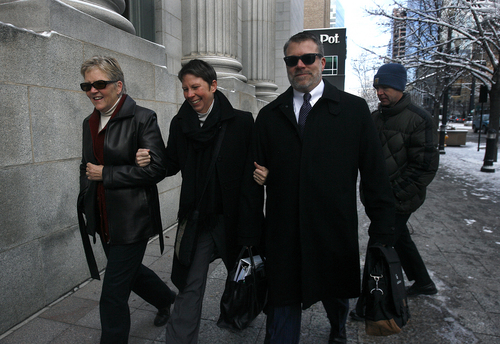This is an archived article that was published on sltrib.com in 2014, and information in the article may be outdated. It is provided only for personal research purposes and may not be reprinted.
The three-judge panel that will hear same-sex marriage appeals from Utah and Oklahoma brings years of experience to the task, and what one court observer says is a "slightly" conservative bent.
The 10th Circuit Court of Appeals judges, selected Monday via a computerized random lottery system, are Paul J. Kelly Jr.; Carlos F. Lucero; and Jerome A. Holmes. Holmes was one of the two judges who rejected Utah's request that U.S. District Court Judge Robert J. Shelby's decision overturning the marriage ban be stayed, eventually granted by the U.S. Supreme Court.
The three will preside over oral arguments in the Utah appeal on April 10 in Denver; they will hear the Oklahoma case on April 17. Parties in both cases agreed to the parallel but separate proceedings.
Kelly was nominated to the bench by former President George H.W. Bush in 1991 and took his seat in April 1992. Lucero was nominated in March 1995 by former President Bill Clinton and was confirmed by the U.S. Senate months later. Holmes was nominated by former President George W. Bush in May 2006 and took his seat months later.
"My sense is this panel is slightly more politically conservative than an average 10th Circuit panel, but how any specific judge will resolve this issue is unclear and may not reflect political views," said Carl Tobias, a law professor at the University of Richmond School of Law and a judicial appointment expert.
Kelly, 73, is a graduate of the University of Notre Dame and Fordham University School of Law, after which he went into private practice. He served two terms as a representative in the New Mexico Legislature, from 1977 to 1981. Kelly, who works from Santa Fe, is a volunteer firefighter and EMT.
In a 2004 interview with Howard J. Bashman for the "How Appealing" blog on appellate litigation, Kelly said personal and political leanings "should play no role in deciding a case. It is completely inappropriate to decide cases based solely on one's own personal preferences."
He added that the politicization of the judicial confirmation process "erodes respect for the judiciary by implying that what cannot be achieved legislatively may be achieved through judicial selection."
Kelly offered several tips for attorneys appearing before 10th Circuit panels, including a caution that they carefully proofread their briefs.
"You don't want us distracted from the merits by missing verbs, misspelled names, incorrect citations, improper grammar or sentences that run for pages," Kelly told Bashman.
The state may have avoided a miscue on that point when it requested and received permission to file a corrected reply brief that addressed some 90 errors ranging from incorrect page citations to missing case names, spelling and punctuation errors.
Lucero, 73, is a graduate of Adams State College (Colorado) and George Washington University Law School in Washington, D.C.; Senate Majority Leader Harry Reid, D-Nev,, was a law school classmate. Lucero was a law clerk for a District of Colorado judge and then went into private practice. Lucero was an adjunct professor at this alma mater from 1968 to 1995. He was the first Hispanic president of the Colorado Bar Association and the founding member of Colorado Rural Legal Services.
During a 2001 panel discussion printed in the New Mexico Law Review, Lucero described a "terrific" brief as one that "concisely, precisely and meticulously" states the issues and why reversal is warranted as a matter of law. Among "pet peeves" he mentioned: unfocused and overly long briefs, which he said attorneys should avoid "at all costs."
With that comment in mind, Lucero may cringe when he digs into the briefs filed by Utah and attorneys representing the three same-sex couples who successfully challenged the state's ban on same-sex marriages. Each filed briefs that exceeded 100 pages.
Lucero said he likes amicus briefs, which is a good thing, given that there are nearly 60 filed in the Utah case alone. His advice to attorneys making oral arguments: Get to the point.
Holmes, 51, was the first African-American appointed to the 10th Circuit Court after a Senate confirmation vote that split 67-30 along partisan lines. The Leadership Conference of Civil Rights opposed Holmes' nomination because of his criticism of affirmative action and support for the death penalty.
Holmes was described at the time of his confirmation by David Lat on an "Above The Law" blog post as "extremely conservative." According to the Congressional Record of the nomination hearings, Holmes was hailed for his "demonstrated understanding" of the limited role of the federal judiciary under the U.S. Constitution. He was quoted as having said that he recognized "very clearly the distinction between the role of a writer on social policy issues in their personal capacity and the role of a judge in adjudicating the rights and liberties of individual litigants."
Holmes also said that as a judge it would be "inappropriate for me to import my personal views on policy issues into the decision-making process."
Holmes is a graduate of Wake Forest University, Georgetown University Law Center and Harvard University. He clerked for two federal judges, including Judge William J. Holloway Jr. of the 10th Circuit. Holmes spent three years in private practice in Washington, D.C., and then a decade as an assistant U.S. attorney for the western district of Oklahoma, where he was part of the prosecution team in the Oklahoma City bombing case. He also served as the anti-terrorism coordinator for the western district. Holmes briefly returned to private practice before being appointed to the court.



